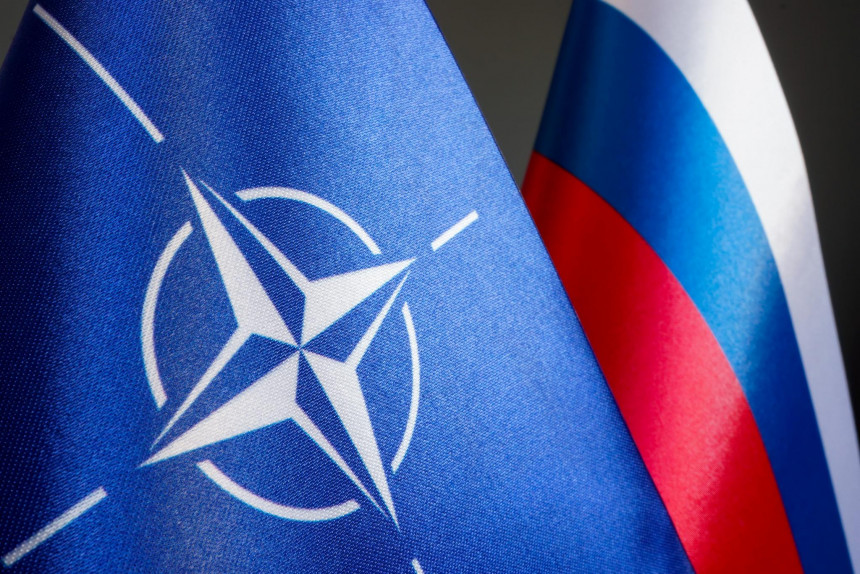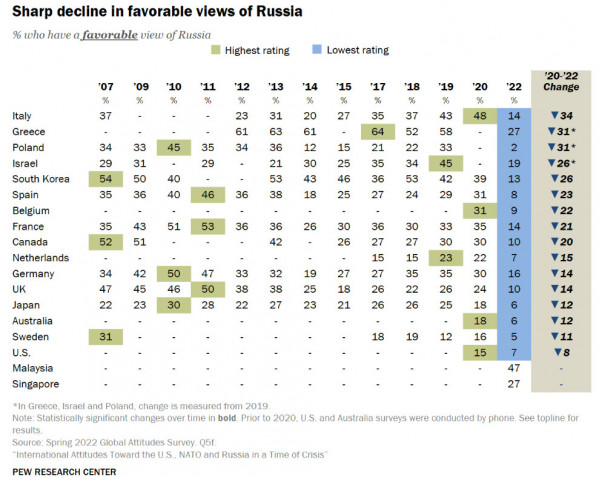NATO summit results reflect a change in the world’s attitude towards Russia

The long-awaited and already historic NATO Madrid Summit has come to an end. While it can always be said that it could have been better, overall we can be satisfied with the decisions taken there. The main result was the new NATO strategy, which identifies Russia as the main threat.
The Madrid Summit was the first meeting of NATO leaders since the Russian invasion of Ukraine and its outcome reflects the fundamental changes that have taken place in the world during this period. One of these changes is the sharp deterioration in attitudes towards Russia, as shown by a Pew Research study. The Kremlin has finally achieved what it has been trumpeting on television for years: no one likes us, everyone is Russophobic, we are treated badly just because we are Russian. The Russians themselves stubbornly refuse to see the connection between this dislike and Russia's actions on the international stage. We are disliked not because we have invaded a foreign country, but because we are sovereign, independent and not going to kowtow to the Rothschilds, the Gates and all the other Freemasons.

The unity that we have seen both at the Madrid Summit and at the G-7 meeting before it is a direct consequence of this change in attitude. It should be noted that this change in attitude was not so much caused by the invasion of Ukraine itself, but by the atrocities and methods of warfare that followed, which are quite unacceptable in the civilized world.
The Putinist objections, invoking the various Iraqs and Yugoslavias, are easy to disprove. Let them name a specific case comparable to Bucha (the mass murder of civilians, including tied hands and bullets in the back of the head), the aerial bombardment of the Mariupol theatre and the terroristic missile bombardment of cities.
I would venture to suggest that if the Russian invasion had gone according to the original plan - Zelensky escapes in a helicopter offered by the Americans, the centralized leadership of the army falls, Russian forces take Kyiv, Kharkiv, Odesa with little casualties or damage, and it all ends within a week with Yanukovych back in the presidential chair - then much of the world would have had a different attitude. Then the change in attitudes, especially in the traditionally Russia-friendly countries of southern Europe, would not be nearly so dramatic. This in turn would allow Putin's various "understanders" - both the ideological (useful idiots) and the paymasters (Schroeders and Kissingers) - to speak more convincingly about the need not to annoy Putin; to respect Russia's strategic interests; and, in general, strengthening NATO's eastern wing only provokes Putin and increases the risk of a major war breaking out.
This kind of talk did not come in any variations at the Madrid NATO-G7 summit. The rather ambiguous situation of everyone seemingly realizing the potential threat from Putin's Russia, but pretending that some elements of partnership and cooperation can be maintained with the result that the avoidance of naming Russia as the main threat continues, was ended. This dual situation has now come to an end and the entire NATO bureaucracy will be able to refocus its activities on reducing this threat without looking over its shoulder.
The previous security strategy was based on the principle of deterrence - the presence of troops from leading NATO countries is in itself a strong enough deterrent for an aggressor not to dare to attack - but now this strategy has been reversed. The new NATO strategy is to move from deterrence to defense, which fundamentally changes all strategic planning.
As has now been revealed, thanks to the courage of Estonian Prime Minister Kaja Kallas to speak out, the previous strategy did not envisage defending the territories of the Baltic States at all. It envisaged, from the outset, retreat, loss of territory and retaking it in other ways. My guess is that it was by trying to negotiate, bargain and reach some kind of acceptable agreement.
It should be noted that this doctrine of “agreement” was quite popular until June 16 this year, when the leaders of the notional “peace party”, Macron, Scholz and Draghi, arrived in Kyiv. It is not impossible that it was with some kind of agreement (peace plan) in their pockets. But after the visit to the bombed Irpin and the talks in Kyiv, it became clear even to these "apostles of agreement" that it was impossible to reach an agreement with the global bandit, because no agreement with him was a guarantee of anything. Today we have an agreement, but tomorrow the signed paper is worth nothing.
The new defense strategy means that it will not be the presence of NATO troops alone that will be the main cornerstone on which the defense of the Baltic States is based, but a sufficiently large and, above all, technically well-equipped group of troops that will be able to actually resist the aggressor and prevent it from quickly implementing its tactical and, in our small territory, therefore also strategic plans.
How does this change Latvia's security? Unfortunately, proposals for a permanently deployed NATO troop presence in the Baltic area were rejected. Probably as echoes of the seemingly forgotten, but by no means ineradicable, principle of not annoying Putin too much. Instead, the rotational battalions of NATO forces in the Baltics will be expanded to brigade level. In Latvia, this means increasing the NATO contingent from 1,300 soldiers to 4,000. Long-range air defense systems are also to be deployed in Latvia.
All this undoubtedly increases our security, but it remains an open question as to when this level of security will be achieved, given that we need security now. The Lithuanian/Kaliningrad crisis itself is not yet fully resolved, and we can expect more and more similar crises in the future.
From this point of view, the picture is not so rosy. In order to be able to deploy several thousand more NATO fighters in Latvia, a new military base needs to be built, and not only has construction not yet started, but no site has even been identified where it could be built. The situation is similar in Estonia and Lithuania. In other words, nothing significant will change in the next three to five years (it is estimated that the decisions taken at the Madrid Summit could be implemented by 2027).
Does this mean that our security situation is as uncertain as Kallas drew it up to be? Not quite. It is no coincidence that I started this article with a Pew Research poll. There has been a fundamental shift in attitudes towards Putin's Russia. Both in society as a whole and in the political class. If Russia were to concentrate its armed forces on our borders, NATO would not sit on its hands and would not limit itself to warning only Putin, Macron-style: listen, colleagues, don't do stupid things!
That might have been the case until February 24, when most experts simply did not believe that Putin would actually dare to do something like what he did. Now a lot has changed. This includes the assessment of the Russian army's own combat capabilities, which have turned out to be much lower than NATO experts had estimated. This has also increased the readiness of the NATO leadership to give the aggressor a proper counter-attack.
The accession of Finland and Sweden to NATO is also a clear boost to the security of Latvia and the Baltic States. On the very eve of the summit, a compromise was reached with Turkey, and Sweden and Finland can now be considered to be in NATO. If not yet de jure, then de facto.
It is difficult to say what the price of this compromise is yet, because both sides are not very specific. Turkish President Recep Tayyip Erdoğan, however, has been boasting that Turkey has got everything it wanted, but this is hardly probable, as the initial demands were very difficult for Finland, and especially Sweden, to accept. For example, the extradition of people (mostly Kurds) who had found political refuge in those countries from persecution in Turkey. It is now clear that Sweden and Finland will no longer give any support to organizations that the Turkish authorities consider to be terrorist. This includes the Kurdistan Workers' Party, which, in Germany, for example, regularly holds large demonstrations and operates in a perfectly legal manner.
The formal and full accession of Finland and Sweden to NATO will take place after the approval of all the parliaments of the Member States, and for the time being it does not look as if any country could torpedo the process. It is therefore very likely that both these countries in our region will be in NATO already this year, and it will be even more difficult for Russia to threaten anyone.
In the meantime, the war that Putin has started continues, and as long as his regime continues to rule the Kremlin, nothing can guarantee stable world peace. I have already said that much has changed in the world. Unfortunately, one thing has never changed and will never change. It is the cowardice that prevails in a large part of society, which Putin hopes for and relies on so much. However, the NATO unity demonstrated in Madrid can at least raise this level of peacekeeping. We can console ourselves with that.